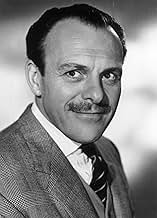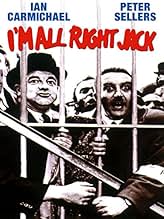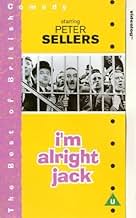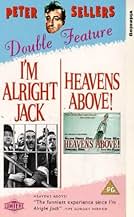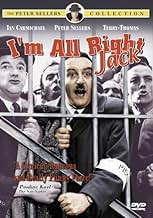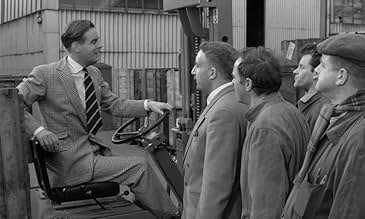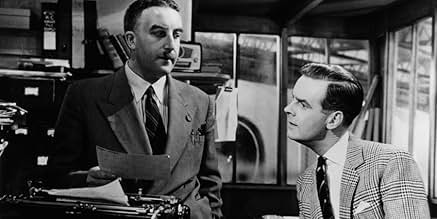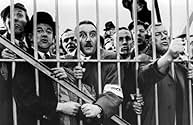IMDb RATING
7.1/10
4.7K
YOUR RATING
A naive, dimwitted young man of aristocratic background in search of a career becomes caught up in the struggles between his profit-minded uncle and an aggressive labor union.A naive, dimwitted young man of aristocratic background in search of a career becomes caught up in the struggles between his profit-minded uncle and an aggressive labor union.A naive, dimwitted young man of aristocratic background in search of a career becomes caught up in the struggles between his profit-minded uncle and an aggressive labor union.
- Won 2 BAFTA Awards
- 3 wins & 1 nomination total
Dennis Price
- Bertram Tracepurcel
- (as Denis Price)
Featured reviews
Superior example of British comedy film making amongst a sea of duds. British film-makers never got it more right than here. Tremendous story and script plus wonderful performances from a whole host of character actors, especially Peter Sellers and Terry-Thomas.
Very funny satire on British industrial relations.
Very funny satire on British industrial relations.
The cast alone is a triumph in this movie - some of the best British character actors who ever lived are here: Terry Thomas, Miles Malleson, John Le Mesurier, all backing up Ian Carmichael as the earnest, silly-ass upper-class bumbler and Peter Sellers as Fred Kite, the Marxist shop steward. Sellers in particular is wonderful; his Fred Kite is a lower class striver who has acquired just enough education to give him an inflated idea of his own abilities, but not enough to realize the gaps and inadequacies in his views. He is a perfect realization in miniature of Taine's statement that there is nothing more dangerous than a general idea in a narrow, empty mind. He boasts to his Oxford-educated gentleman lodger about the summer course he took at the university once, reminding him in a familiar fashion about the very good marmalade and toast provided by the college, while the obviously wealthy young man politely admits that he wasn't acquainted with the public dining hall during his years there.
The plot becomes more and more complex as the movie progresses, with almost everyone turning out to be on the take. The climax comes in a free-for-all over a bag containing thousands of pounds intended to bribe Stanley into joining the sensible schemers plundering the public while paying lip service to public service and solidarity with the working class. Malcolm Muggeridge has a interesting cameo in this scene, playing himself. Most recent broadcasts of this movie have edited out the disturbing racist statements of the working class characters, but the original movie had no sentimental soft spot for anyone, workers or bosses.
The plot becomes more and more complex as the movie progresses, with almost everyone turning out to be on the take. The climax comes in a free-for-all over a bag containing thousands of pounds intended to bribe Stanley into joining the sensible schemers plundering the public while paying lip service to public service and solidarity with the working class. Malcolm Muggeridge has a interesting cameo in this scene, playing himself. Most recent broadcasts of this movie have edited out the disturbing racist statements of the working class characters, but the original movie had no sentimental soft spot for anyone, workers or bosses.
I was quite surprised with this film, not because of liking it (I did), but just how much union politics the Boulting Brothers put on their sleeve with working on this movie. I have been in a Union business that failed before, and I was quite shocked at how much I could compare my own experiences with what was on display here with the Unions and Management trying to maneuver themselves ahead of on another. While Peter Sellers does put on a great performance, this really is Ian Carmichael's movie. I hadn't seen any of his work, and this was a great introduction. All of the other cast is great as well. One final note, it probably contains the most annoyingly catchy title song ever, it'll probably haunt your cranium for days.
Ah, progress. Never mind that tosh. "I'm All Right Jack" is a hilarious send up of the 20th century very much on point today, an anything-goes capitalist-meets-socialist system where workers and owners are equally victimized.
Peter Sellers won the British Academy Award for Best British Actor for his performance as union leader Fred Kite, beating out a field that year which included Laurence Olivier, Laurence Harvey, Richard Burton, and Peter Finch. Ian Carmichael is the actual lead actor in "I'm All Right Jack", and Kite doesn't even show up until after the first 20 minutes, but Sellers makes Kite a compelling and comedic character worth remembering as a symbol of organized labor run amuk.
A kind of sequel to "Private's Progress", also featuring Carmichael in the role of Stanley Windrush, "I'm All Right Jack" is a swinging social satire. Two factory owners (played by Dennis Price and Richard Attenborough) conspire to create a labor strike at a munitions factory to get a higher price. To do that, they need someone to create a bit of friction. Enter Windrush, a total innocent upper-class twit who only cares about earning his pay, no matter how much that offends Kite and other labor leaders.
"We're living in the welfare state," says the middle manager Hitchcock (Terry-Thomas). "I call it the farewell state."
"I'm All Right Jack" starts out very cheeky indeed, with a surprising eyeful of female nudity circa 1959 and cracks at religion and the military. Later, a stuttering character sees an array of photographers and asks: "Why don't you tell them to f-f-f-photograph something worthwhile."
The only major problem with "I'm All Right Jack" is the slowness of the film right up until Windrush arrives at Missiles Ltd., after which the comedy becomes a kind of classless class comedy, where shrapnel flies thick and fast and no one is immune. Sellers' performance is brilliant, giving you a character who's likable even as he plays the antagonist. You can scorn his love of Stalinist Russia, which he boils down to cornfields and ballet, but you empathize with his fairness (not wanting to fire Windrush is his undoubted downfall) and his sensitivity for the feelings of Mrs. Kite (Irene Handl) and their daughter (Liz Fraser). He's just a bit extreme.
"We cannot and do not accept the principle that incompetence justifies dismissal," Kite argues. "That is victimization."
The real bad guys are the bosses guying the system, though John Boulting, who directed and co-wrote this with Alan Hackney and Frank Harvey, wants you to see the union abuses that make such a scam not only possible but desirable to the upper classes.
Sellers also appears at the film's outset as "Sir John", a men's-club inhabitant who witnesses the end of World War II as an unpleasant upending of the old social order, before disappearing in the postwar wake. "A solid block in what seemed the edifice of an ordered and stable society," is his postscript.
Contrast him with the very hip, 60s-sounding Al Saxon theme song that sticks its post-war, pre-Beatles attitude in your face as smartly as flipping the bird to Churchill (something else we get to see in the first few minutes), and you find yourself watching what had to be for 1959 a very mod film. It still stands up today as one of the best labor-management comedies, even if the British class system it addresses is no more.
Peter Sellers won the British Academy Award for Best British Actor for his performance as union leader Fred Kite, beating out a field that year which included Laurence Olivier, Laurence Harvey, Richard Burton, and Peter Finch. Ian Carmichael is the actual lead actor in "I'm All Right Jack", and Kite doesn't even show up until after the first 20 minutes, but Sellers makes Kite a compelling and comedic character worth remembering as a symbol of organized labor run amuk.
A kind of sequel to "Private's Progress", also featuring Carmichael in the role of Stanley Windrush, "I'm All Right Jack" is a swinging social satire. Two factory owners (played by Dennis Price and Richard Attenborough) conspire to create a labor strike at a munitions factory to get a higher price. To do that, they need someone to create a bit of friction. Enter Windrush, a total innocent upper-class twit who only cares about earning his pay, no matter how much that offends Kite and other labor leaders.
"We're living in the welfare state," says the middle manager Hitchcock (Terry-Thomas). "I call it the farewell state."
"I'm All Right Jack" starts out very cheeky indeed, with a surprising eyeful of female nudity circa 1959 and cracks at religion and the military. Later, a stuttering character sees an array of photographers and asks: "Why don't you tell them to f-f-f-photograph something worthwhile."
The only major problem with "I'm All Right Jack" is the slowness of the film right up until Windrush arrives at Missiles Ltd., after which the comedy becomes a kind of classless class comedy, where shrapnel flies thick and fast and no one is immune. Sellers' performance is brilliant, giving you a character who's likable even as he plays the antagonist. You can scorn his love of Stalinist Russia, which he boils down to cornfields and ballet, but you empathize with his fairness (not wanting to fire Windrush is his undoubted downfall) and his sensitivity for the feelings of Mrs. Kite (Irene Handl) and their daughter (Liz Fraser). He's just a bit extreme.
"We cannot and do not accept the principle that incompetence justifies dismissal," Kite argues. "That is victimization."
The real bad guys are the bosses guying the system, though John Boulting, who directed and co-wrote this with Alan Hackney and Frank Harvey, wants you to see the union abuses that make such a scam not only possible but desirable to the upper classes.
Sellers also appears at the film's outset as "Sir John", a men's-club inhabitant who witnesses the end of World War II as an unpleasant upending of the old social order, before disappearing in the postwar wake. "A solid block in what seemed the edifice of an ordered and stable society," is his postscript.
Contrast him with the very hip, 60s-sounding Al Saxon theme song that sticks its post-war, pre-Beatles attitude in your face as smartly as flipping the bird to Churchill (something else we get to see in the first few minutes), and you find yourself watching what had to be for 1959 a very mod film. It still stands up today as one of the best labor-management comedies, even if the British class system it addresses is no more.
10mzinkin
For me, this is the best film of all time. A superb cast of the UK's finest character actors and an A1 script.
Peter Sellers was truly magnificent as the left wing union shop steward and Terry Thomas excelled in playing the two faced Personnel Manager. Among his classic comments are "The Management have behaved like absolute stinkers" when talking to the union and " They are a complete shower" when talking to Management about the unions. Another fine comment is when on being told that some bigwigs are visiting the factory, Terry Thomas replies "You better spruce the place up a bit, you know soap in the toilets, that sort of thing".
I must have seen this film at least 20 times and I never grow tired of it. Great story, fine comedy and great acting. Never has a film handled the issue of industrial relations in such an amusing and pertinent manner.
Peter Sellers was truly magnificent as the left wing union shop steward and Terry Thomas excelled in playing the two faced Personnel Manager. Among his classic comments are "The Management have behaved like absolute stinkers" when talking to the union and " They are a complete shower" when talking to Management about the unions. Another fine comment is when on being told that some bigwigs are visiting the factory, Terry Thomas replies "You better spruce the place up a bit, you know soap in the toilets, that sort of thing".
I must have seen this film at least 20 times and I never grow tired of it. Great story, fine comedy and great acting. Never has a film handled the issue of industrial relations in such an amusing and pertinent manner.
Did you know
- TriviaThe machines in the Num Yum factory are a spoof on the Moloch scenes from Fritz Lang's film Metropolis.
- GoofsWhile Stanley Windrush demonstrates his forklift driving skills for Mr. Waters, he says "Well, I'm shifting these generators from the stores to here, for loading up." He drives over a bump and the (presumed full) boxes bounce as though they were empty.
- Crazy creditsOpening quote: "Oh! Brave New World that hath such people in't" --William Shakespeare
- ConnectionsEdited into Heroes of Comedy: Terry-Thomas (1995)
- How long is I'm All Right Jack?Powered by Alexa
Details
- Release date
- Country of origin
- Language
- Also known as
- I'm All Right Jack
- Filming locations
- Flexello Factory, 268 Bath Road, Slough, UK(Stanley Windrush walks up to the factory entrance)
- Production companies
- See more company credits at IMDbPro
- Runtime
- 1h 45m(105 min)
- Color
- Aspect ratio
- 1.66 : 1
Contribute to this page
Suggest an edit or add missing content


